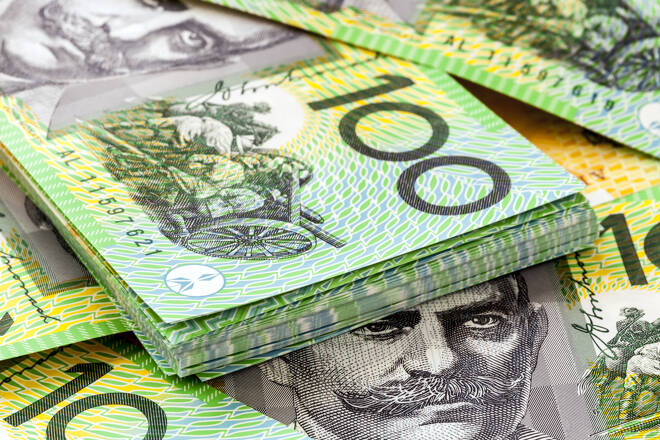Advertisement
Advertisement
AUD to USD Forecast: Aussie Inflation Fears Amid Services PMI Drop
By:
Key Points:
- On Friday, June 21, private sector PMI numbers from Australia attracted investor attention.
- Investor focus will likely be on the Judo Bank Services PMI and price pressures on headline inflation.
- Later in the session on Friday, the US Services PMI also needs consideration amidst uncertainty about a September Fed rate cut.
Australian Services PMI Raises Inflation Alarm
On Friday, June 21, Australian private sector PMI numbers influenced buyer appetite for the AUD/USD.
The focus was on the Services PMI, with a tight housing market and property sector service prices fueling demand-driven inflationary pressures.
The Judo Bank Services PMI unexpectedly fell from 52.5 to 51.0 in June. According to the preliminary survey, input prices trended lower, while output prices continued to rise.
Judo Bank Chief Economic Advisor Warren Hogan had this to say about the price trends,
“Service sector price indicators pulled back in June, consistent with the view that inflation is gradually easing in 2024. However, index levels point to inflation still above the RBA’s target of 2-3%.”
On Tuesday, RBA Governor Michele Bullock stated the Board discussed hiking interest rates to tame inflation. Recent inflation figures and Q1 GDP numbers highlighted the effects of inflation on the Australian economy.
In Q1 2024, the Australian economy ground to a halt, expanding by just 0.1%. Conversely, the Australian annual inflation rate stood at 3.6% in Q1 2024. While down from 4.1% in Q4 2023, inflation remained well above the RBA target range.
Sky News Business Editor Ros Greenwood spoke about the Australian economy and inflation this week, saying,
“Notwithstanding the fact that the economy is barely teetering above a recession right now with the last quarter just 0.1 of a percent – in this quarter probably negative. The reality is that you’d expect under normal circumstances the Reserve Bank would come to the rescue, start to cut interest rates, and get some economic growth going – well it can’t do that right now.”
Will the Australian Monthly CPI Indicator provide relief on Wednesday, June 26?
Economists expect more pain, forecasting an increase from 3.6% to 3.8% in May.
Considering the RBA determination to tame inflation at all costs, the next move is more likely an interest rate hike than a rate cut.
US Economic Calendar: US Services PMI in the Spotlight
Later in the session on Friday, preliminary private sector PMI numbers will influence investor bets on a September Fed rate cut.
As the main contributor to inflation, the S&P Global Services PMI will impact the AUD/USD pair more. Economists forecast the Services PMI to fall from 54.8 to 53.7.
Softer-than-expected numbers could raise investor bets on a September Fed rate hike. However, investors should consider the sub-components, including input prices and housing services inflation.
FOMC member Austan Goolsbee recently raised concerns about the ongoing effects of housing services inflation on headline inflation. Improving housing market conditions could further exacerbate the effects.
Other stats include Manufacturing PMI and existing home sales figures. However, reports will likely play second fiddle to the S&P Global Services PMI numbers.
Short-Term Forecast
Near-term AUD/USD trends will hinge on the Australian and US services sector PMIs. A weaker US Services PMI may raise investor bets on a September Fed rate hike and tilt monetary policy divergence toward the Aussie dollar. The Australian Services PMI did not write off the chances a 2024 RBA rate hike.
AUD/USD Price Action
Daily Chart
The AUD/USD hovered well above the 50-day and 200-day EMAs, confirming the bullish price signals.
An Aussie dollar move through the $0.67003 resistance level could give the bulls a run at the $0.67500 handle. A break above $0.67500 would support a move toward the $0.67967 resistance level.
Service sector PMI numbers and FOMC Member commentary require investor attention.
Conversely, an AUD/USD fall through the $0.66500 handle could give the bears a run at the 50-day EMA. A break below the 50-day EMA could signal a drop toward the 200-day EMA and the $0.65760 support level.
With a 14-period Daily RSI reading of 54.36, the AUD could return to the $0.67500 handle before entering overbought territory.
About the Author
Bob Masonauthor
With over 28 years of experience in the financial industry, Bob has worked with various global rating agencies and multinational banks. Currently he is covering currencies, commodities, alternative asset classes and global equities, focusing mostly on European and Asian markets.
Advertisement
